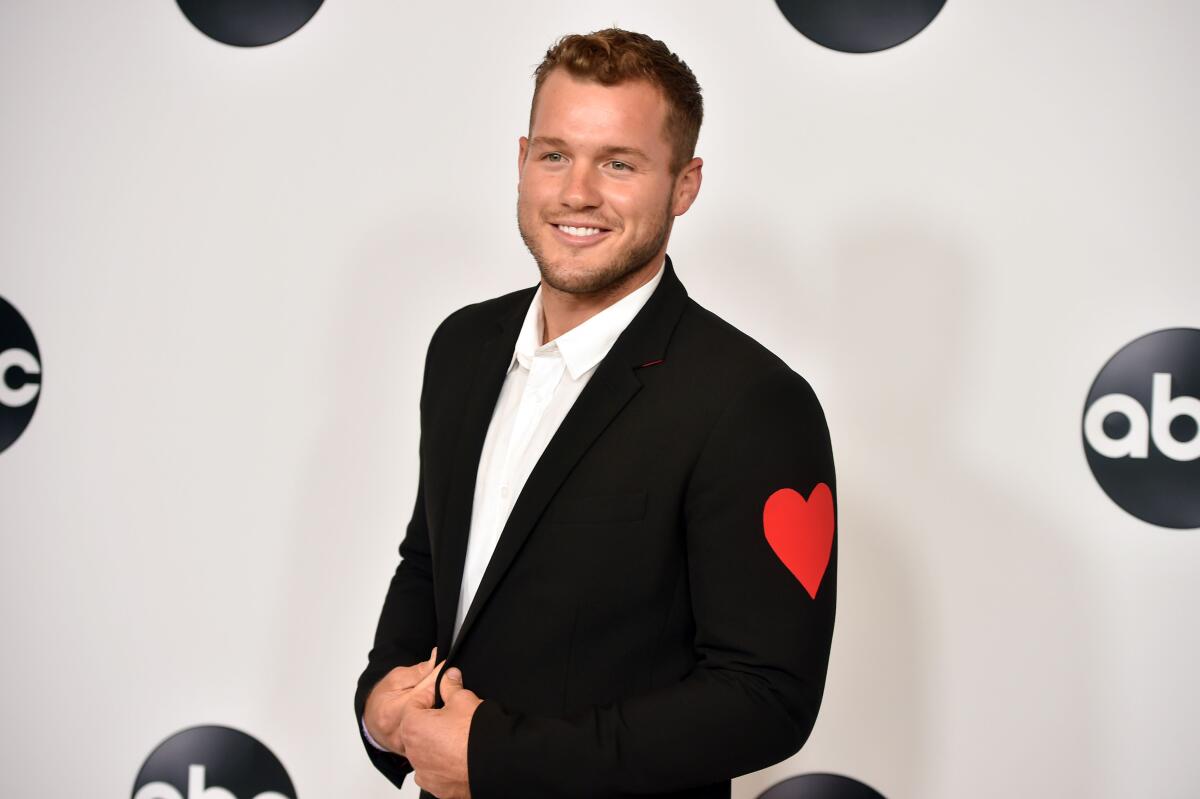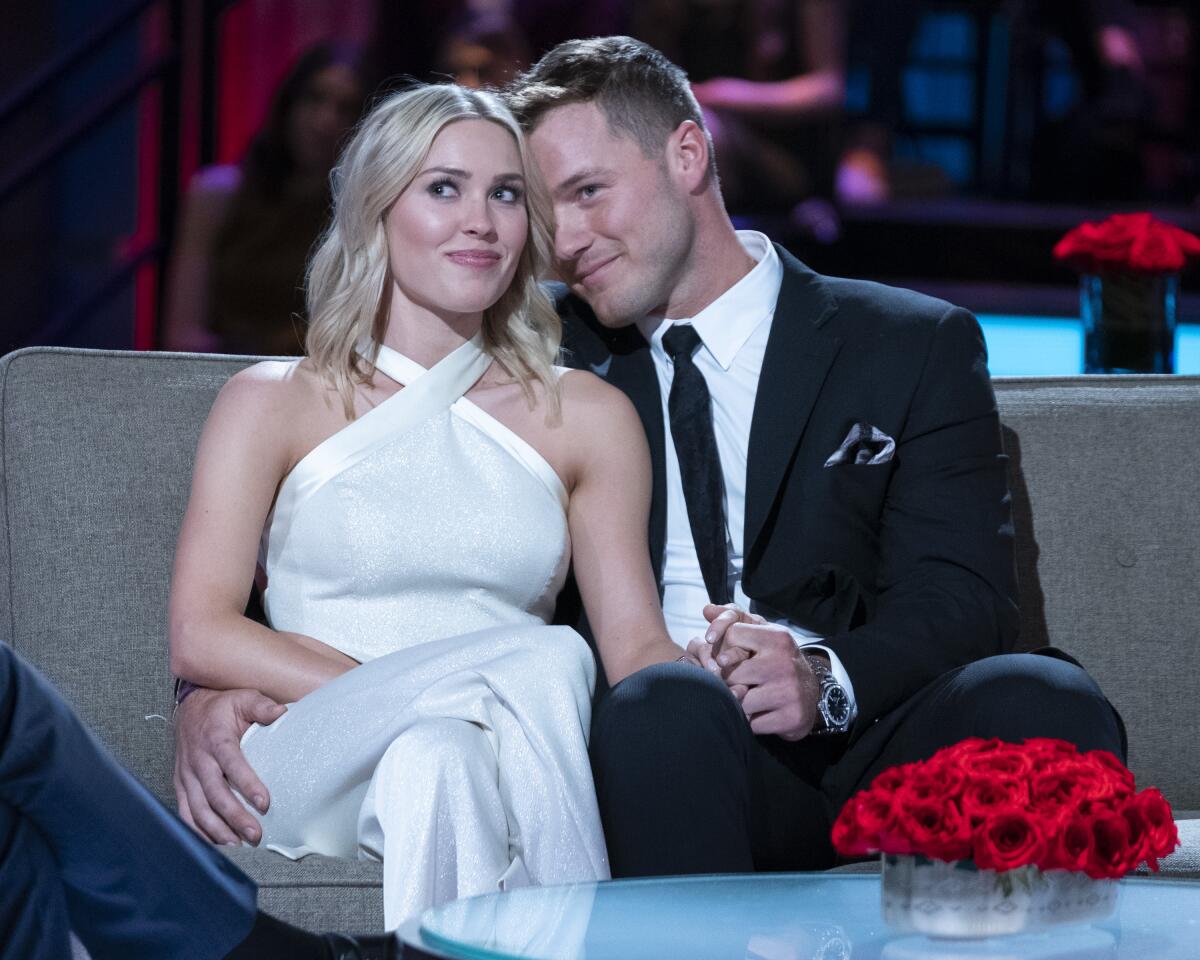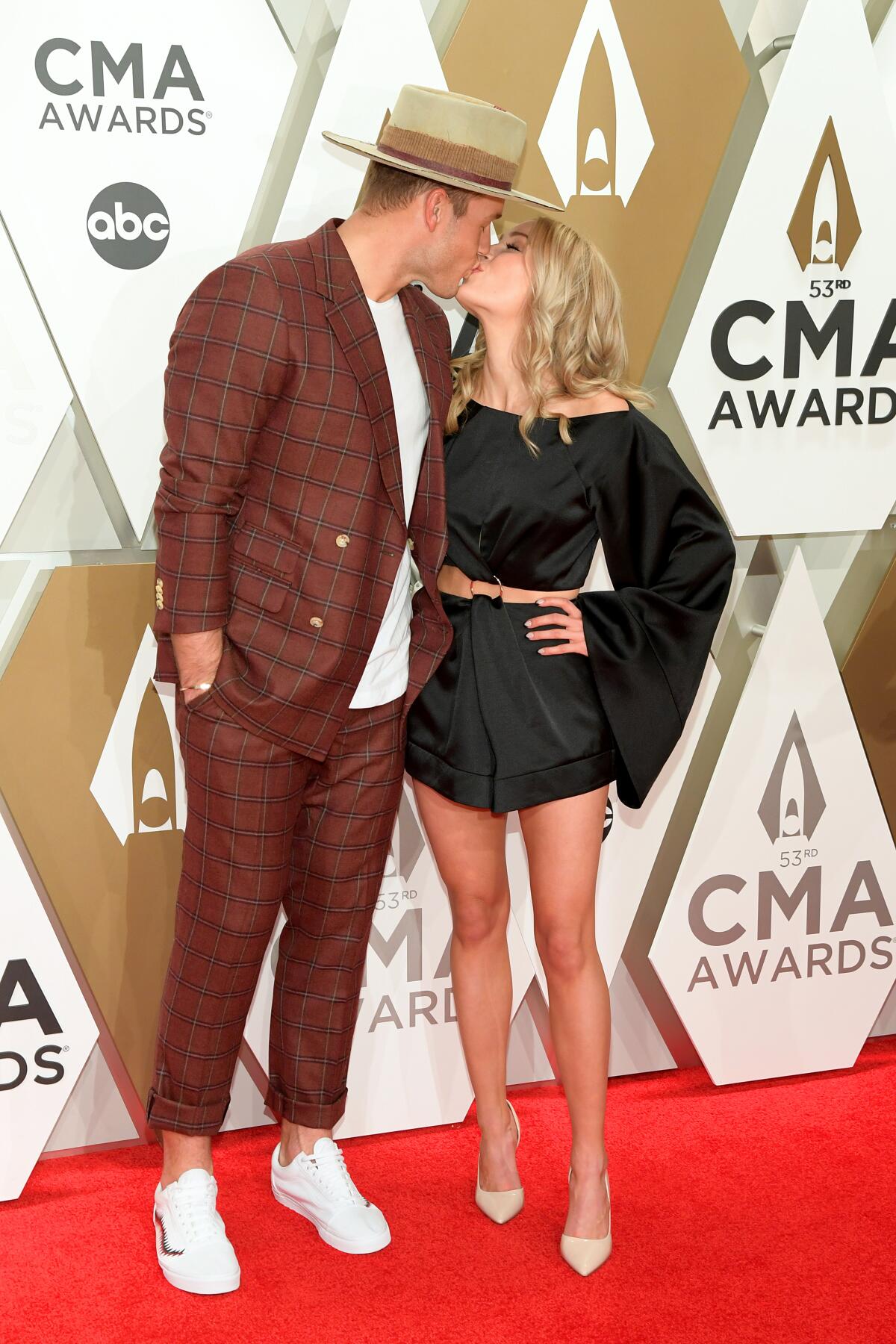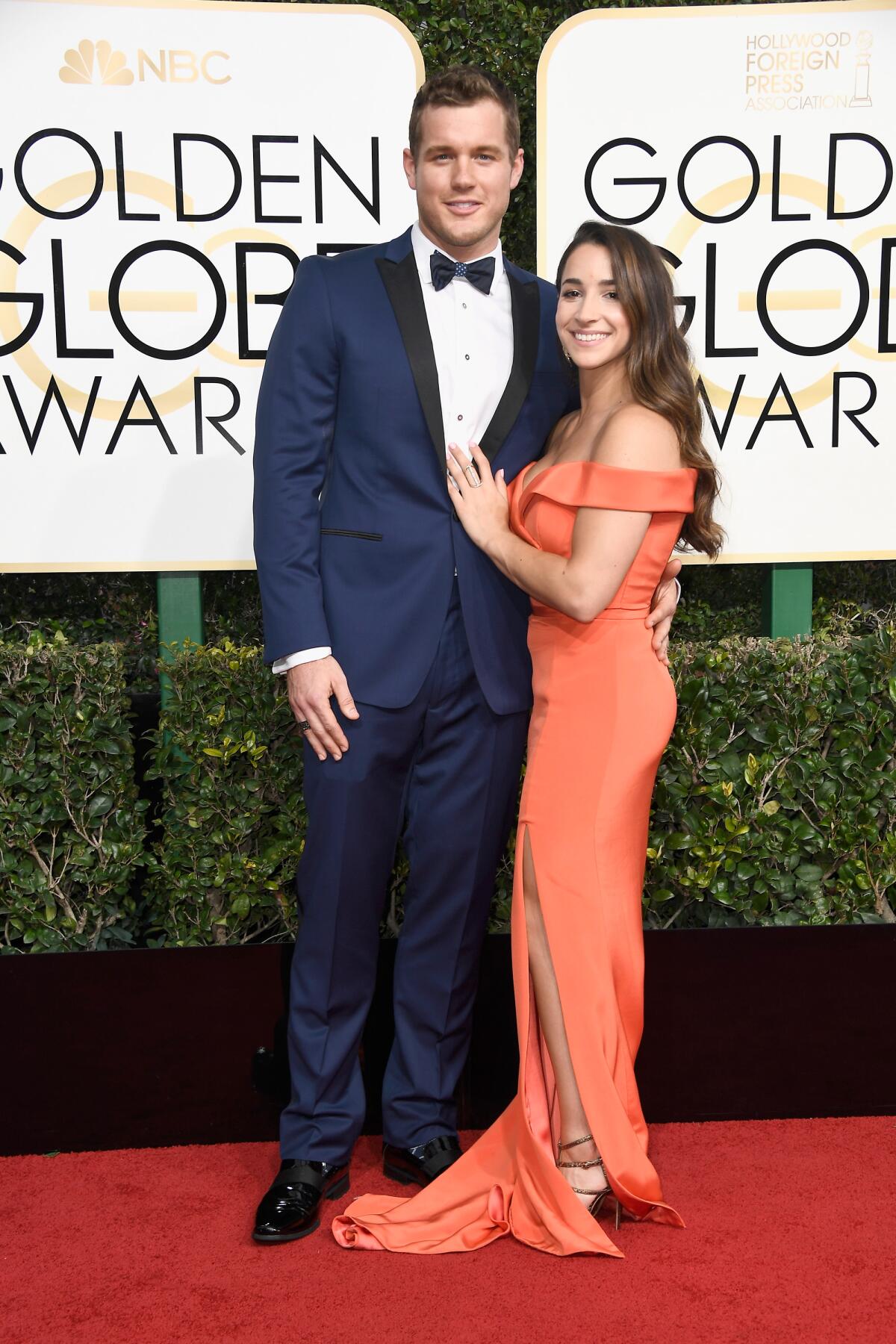Recovered from the coronavirus, Colton Underwood tackles a new foe: ‘The Bachelor’ franchise

- Share via
Colton Underwood woke up in a panic, gasping for air, his bed sheets soaked. Instinctively, he knew: He had been infected with the coronavirus.
He wasn’t certain where he’d been exposed — possibly at a celebrity ski event in Beaver Creek, Colo., this month — but lying in his bed in L.A., he started to panic. He logged onto Amazon, buying cans of supplemental oxygen. His girlfriend, Cassie Randolph — the woman he ended up choosing at the end of his 2019 stint on “The Bachelor” — began making frantic calls, trying to find a doctor who would test him for COVID-19.
The following day, March 18, Randolph’s family in Huntington Beach found a local practitioner who could administer a drive-through test. Forty-eight hours later, the results were in: He was positive. Because he had already been around the Randolphs, they offered to help take care of him in their home. So he isolated himself on the third floor of their beachside abode, taking “the combination of drugs that the president recommended,” Hydroxychloroquine and Azithromycin.
Within five days, his fever was gone, his cough had eased and his body aches had subsided. So he tweeted about how the medicine had made him feel better.
“But I had to take my tweets down because people were threatening to sue me for false claims,” Underwood said, referencing the controversial drugs, which have been in short supply and can cause dangerous side-effects. “I had people with Lupus coming at me saying ‘You’re taking our medication.’ I was receiving death threats. It’s scary.”
Now, Underwood is steeling himself for another delicate situation: Promoting his new book in the midst of a global pandemic. On Tuesday, Simon and Schuster published “The First Time: Finding Myself and Looking for Love on Reality TV.” Underwood, who was billed as “the virgin Bachelor” — hence the title of the book — famously jumped a fence at the end of his season and tried to run away from the cameras when he became frustrated with the production.
In a Skype conversation from his self-isolation den Friday, the 28-year-old spoke candidly about his health, exploring his sexuality, and his complicated feelings toward the “Bachelor” franchise.
How do you feel about your book coming out right now?
This is such a weird time, not only for myself but for everybody, and I don’t want to seem careless going around promoting my book. But I also think it’s an interesting time where people want to read something. I hope people can find an escape in it or something they can take away from it.
When did you start thinking about writing a book, and did you write it on your own?
I went into book discussions probably three or four weeks after my “Bachelor” season aired. I did seek out a ghostwriter for help, because I’m not the strongest writer. We sat for about four or five months and I think we had a little over 40 or 50 hours of just back-and-forth and conversations.
I just felt like it was really important for me to take back control of my story. I felt like I lost control of my life, where they did what they needed to do to make a TV show — but at my expense. This was a very therapeutic way for me to sort of take ownership in it, and I think it starts with the title of leaning into something that they had so much control over.
You write that you warned producers during your season that they were coming “annoyingly close to crossing the line” in playing up your virginity. What were they doing?
The one thing that sort of got to me is: We’re in a time where we’re so aware and conscious to the women in our society. I’m still emotional, and I still have feelings too. If a guy would have gotten out of the limo and popped a cherry in [“The Bachelorette”] Hannah Brown’s face, it would have been a much different reaction than when it happened to me. If a guy got out and wet the driveway down and said “I hope I made you wet?” That’s gross. That’s not something to applaud. But I just went along with it and kept my mouth shut because that was what I was told to do. I was realizing “I’m OK with you guys poking fun every once in a while,” but when it becomes my narrative — when it becomes “Hey, let’s get this guy laid” instead of “Let’s find love for him,” that’s when it was challenging for me.
Do you think that the show did want you to fall in love?
There were lines crossed in my relationship with Cassie that I found out about after the show. There were things that they said and did that compromised my relationship with her. Now, it makes so much sense that she decided to leave. If you’re gonna make a show, at least give me a fair shot to end up with the girl that I’m falling in love with. Your job as a show is to make us come together. I understand we did [come together] at the end, but I had to take it into my own hands and be extreme with it. They value their TV show more so than the love story that they always promote. Actually, there were some things you did that drove us apart and if I didn’t stand up for myself, I probably wouldn’t be with Cassie today.

You talked about some of this in an August 2019 episode of “This American Life” — about how you were angry at production for some of the tactics they used, like flying Cassie’s dad to Portugal so he could tell her he didn’t think she should get engaged.
I’ll just be very honest with you: I got in a lot of trouble for that podcast. It was approved through them, but what I said in there violated my NDA, which I didn’t even realize. My whole thing was: “This is 2020. People don’t want to feel like they’re getting tricked.” I’m not gonna sit here and keep playing this game.
Were you worried, then, about how much you’d be able to reveal in the book? Are you still under contract with the production?
I’m actually out of contract now, finally. I wasn’t when I was writing the book, obviously. I wanted to follow all the rules, business-wise, and be professional. That was the hardest part for me, and I think that’s where my strongest fallout with them came. I was trying to always be professional, and I felt like at times I didn’t get that in return. I was told to be a good little boy and keep my mouth shut and it’s like, “come on, guys, treat me like an adult.” It’s not always clear what you can and can’t talk about, because it’s a mix of business and your personal life. It’s hard for me to not take things personally when your business is my personal life. You can’t tell me, ‘Oh, don’t take it personal, it’s nothing against you.” It’s like, ‘What do you mean? It is. It’s my life.”
So did you take a no-holds-barred approach for the book?
I could have, but what would be the benefit? On one hand, I’m very grateful to the franchise because I’m happily in love with Cassie and I can’t thank them enough for that. But on the other hand, it’s show business and I recognize that. I respect them for doing their job — they’re very, very good at their job. But it doesn’t necessarily mean I have to agree with everything.
You did answer one burning fan question: What the men on the show do when they become sexually excited.
I had a little signal I gave producers like, “Hey, you have to chill.” Every time I yawned, that was my signal. Producers would be like, “Cut! We have to get him out of the water!” My grandma texts me — I gave her a copy of the book and I said, “Hey, just want to let you know there’s some things that might make you uncomfortable.” She’s like, “You know what? I always wondered about boners on that show. I’m glad you addressed that, but it was a little weird.”

You write in the book about questioning your sexuality as a teenager, revealing that you looked at gay porn in high school — and your dad caught you. There was social media chatter about your sexual orientation. Were you tempted to talk about your past struggles?
When I was “The Bachelor,” everyone was like, “Oh, he’s a virgin Bachelor, well, he has to be gay.” I grew up in a very hyper-masculine society with football and also with my faith and my conservative background. My dad didn’t catch me looking at gay porn, per se, but just me researching and Googling: “How do I know if I’m gay?” That was the question that almost broke his heart a little bit. We talked and then never talked about it again. I was scared my community would judge me as this football player that’s supposed to be OK and walk with God. I realized throughout writing this: It’s OK if you don’t do everything to a T. It’s OK to wander off and try to find your own path. It doesn’t make you any less godly or any less of a man.
You talk a lot about being pushed into doing things by producers. You said that, after being on “The Bachelorette,” producers wanted you to go on “Bachelor in Paradise” to pursue an old flame, Tia Booth, if you wanted to be considered for “The Bachelor.” Didn’t you feel bad for stringing Tia along?
One hundred percent. Finally, at a rose ceremony, I looked over at her and I was like, “What am I doing to this poor girl? I need to be honest with myself. I can’t keep listening to producers saying ‘I need to give it a shot.’ I know in my heart of hearts that this isn’t for me and I probably never should have come here.”
OK, so explain that to me: How do you get talked into things? Like asking four different men for their daughter’s hand in marriage?
I might have been brainwashed a little bit during all of this. Asking for permission for marriage was something I grew up valuing. ... When I told [the producers] I felt value in asking the fathers, they wanted me to ask all four. That was a very, very big struggle, and that was very, very hard on me. Quite frankly, at that point, I already knew where my mind was.
So then why did you go through with it?
I wish I had an answer for you. [The producers and I] would meet and I would be like, “I can’t do it, I can’t do it.” With Tayshia [Adams] — I’m probably going to get in trouble for saying this, but whatever — at first, I didn’t ask, because I valued her being engaged before and I didn’t want to do that to her. I didn’t ask when I sat down with her father. And at the very end, [producers] were like, “You have to. You need to pull him again.” By that time, it’s 12, 1 in the morning and I’m like, “OK, can we wrap this up?” It’s like “Well, you know how to wrap this up. Go have that conversation.”
Even that conversation with Matt [Randolph], Cassie’s dad — I read the situation that he wasn’t going to give me permission [to marry his daughter]. I wasn’t going to ask because I wanted it to be a one-time thing. But I think I got prompted [by producers] three or four or 5 five times, being like, ‘Tonight’s a big night. Don’t you have a question you want to ask?” Those are the cutthroat things. They can do a better job of taking a step back and letting the contestants have control over their love and their story.
How did you ultimately decide to come back to “The Bachelor” after jumping the fence?
The therapist played a much bigger role than what people think. The therapist was on the other side of the wall for me. I had some great conversations that actually led me to come back. We talked two or three times a week at least.
Do you think there’s a way for someone to go on the show and maintain their integrity?
That’s the hardest part for me. I like the franchise, I really do. I just hope that they change. I don’t know if that’s naive to say. But I think this year is the opportunity for it with Clare [Crawley, the next Bachelorette]. Hopefully you don’t have to manipulate a 38-year-old grown woman to do things. Hopefully she doesn’t play any games. Clare seems like the one who will stand up and say, “This is what’s gonna happen, you’re gonna respect me and honor my wishes this way.”
What would you say to critics who argue that you knew what you were signing up for?
Totally a fair thing to say. I think as much as I wanted to prepare myself on “Bachelorette” and in “Paradise,” I saw such a small glimpse of what they really could do as far as pulling strings and how much power they really had. Until you become the lead, you don’t realize the magnitude of what goes into making this monster of a franchise. It’s completely fair for someone to say “Hey, don’t bite the hand that feeds you.” That’s not what I’m saying. I’m saying it’s something to stand up for yourself and realize you have a life after this and “The Bachelor” just moves on.

Prior to “The Bachelor,” you dated Olympic gymnast Aly Raisman. You write a lot about your relationship in the book. Did you run anything by her before publication?
I haven’t spoken with her since our breakup. It was so sudden that I just kind of closed that door and left it behind. I’m still good friends with Simone [Biles] and would check in on her through Simone. I leaned on Simone in terms of giving her a head’s up: “I’m going on this show, I want to make sure everybody understands.” I have so much respect and still have so much love for her. Her mission and what she’s chosen to do with her platform is so cool that the last thing I wanted to do is be a distraction — some doofus that is all of a sudden attaching her name to this reality show. The producers allowed me to honor that.
During your bout with Coronavirus, you said you received support from “Bachelor” host Chris Harrison and executive producer Mike Fleiss. So are you on good terms with the production or not?
Yeah, there’s a few that I’m still in touch with. Like I said, as long as they’re professional or respectful I’ll still have my working relationship with them. But for my mental health, it’s good to separate myself. After this, I feel like I can move on and do my own thing. I’m excited for that. I don’t know exactly what the future has in store for me.
More to Read
Sign up for our Book Club newsletter
Get the latest news, events and more from the Los Angeles Times Book Club, and help us get L.A. reading and talking.
You may occasionally receive promotional content from the Los Angeles Times.









